In this Article
Language forms an essential part of our lives, and learning the basic concepts of it can be quite challenging for kids at an early age. Parents try to enforce them as a duty or a thing to be taught, which can make some children sway away from reading or writing altogether. However, there are certain reading games for kindergarten kids that can teach your kids the very same concepts in a way that is entertaining for them and improves their interest in getting to know a language better.
Why is Reading Important for Young Children?
Focusing on reading in young children from an early age is quite important since it has its advantages over the time.
1. Improved Writing
By reading better, your child will be able to form sentences correctly and write them easily.
2. Improved Grammar
The rules of grammar can be absorbed easily by exposing the child as early as possible to grammatically correct sentences.
3. Enhanced Imagination
Reading stories and other articles can stoke their creativity and get their imagination flowing.
4. Future Success
Children who can understand what they read can excel in studies quickly.
5. Real Life Safety
The importance of reading safety signs or road rules in the world can be pretty much a lifesaver for your kids in the long run.
6. Infuse Confidence
A child who can figure out things on his own can build his confidence rapidly.
7. Improved Elocution
Reading from the book helps streamline thoughts and be a better orator ahead in life.
8. Better Vocabulary
There’s simply no other way to improve your collection for words apart from reading as much as you can.
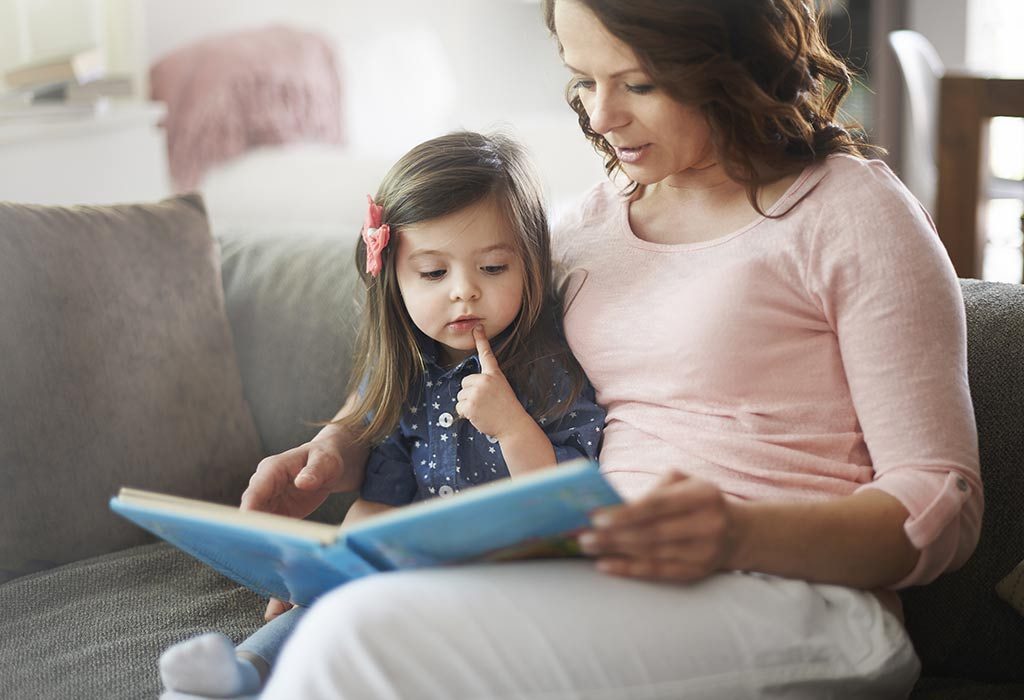
10 Reading Games For Kids
There are numerous fun-filled and exciting reading games for preschoolers that you can opt for and help your child start developing the fascination for reading books.
1. The Treasure Hunt
Start off your child on discovering the magic of reading, by introducing him to the happiness of solving a riddle and getting a prize.
What You Need
- A bunch of paper cards
- Pencil
- Various objects or gifts
How To Play
Rather than turn reading into a job, let your kid start finding out how reading is so integral to any part of their lives. Hide his toys or even new ones along with a few chocolates or gifts in different parts of the house. About those locations, write down simple clues on a piece of paper. Even a simple line as “where do you water the plants” can be enough. Make your child read it out loud, answer it and then find the hidden object.
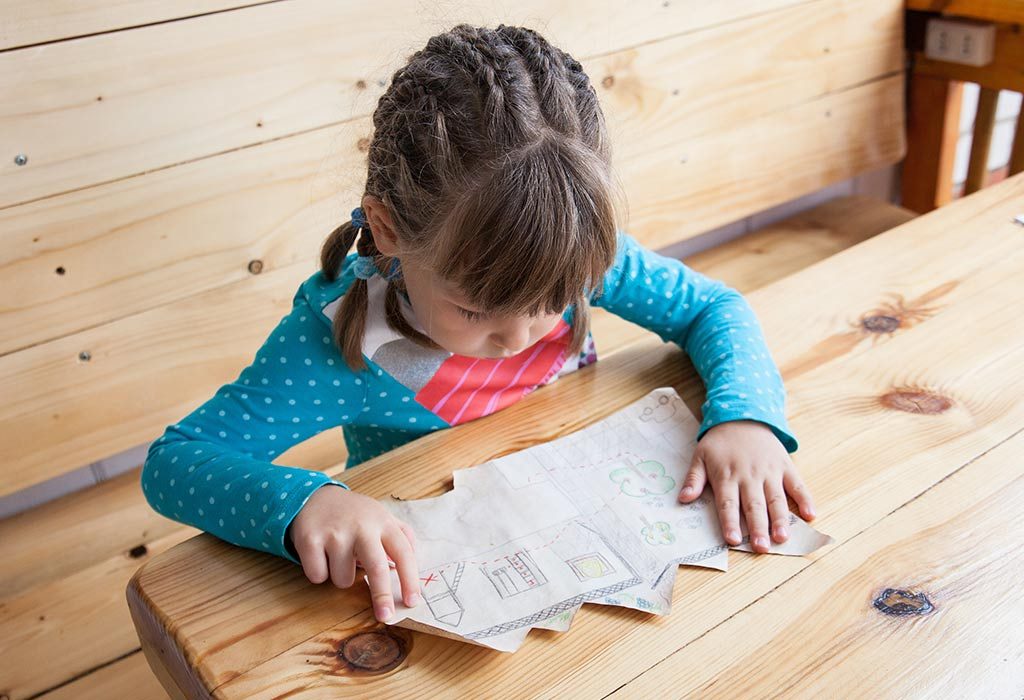
2. Word-Based Snakes And Ladders
Here’s a twist on your child’s favourite game, by replacing the numbers with easy words.
What You Need
- A snakes and ladders board
- Game-related items
- A felt pen
How To Play
You can purchase a special board of this variation, too. Or else, you can use a pen and write simple words that your child can read on all the 100 squares of the board. Play the game just the way you’d play on any other day. Your child can count the squares and say the words aloud as he passes them. By referencing different areas of the board, your child can learn to scan the words by visual identification.
3. Guess The Word
This game requires larger participation from your end, but it directly helps the child comprehend complex questions easily.
What You Need
- A dictionary
- Paper cards
- A Pen
How To Play
Either use a dictionary directly or write various words on flashcards and put them all in a bucket. Let your child pick out a word and tell you the number of letters in it. You now end up asking him questions that can be answered either in a “yes” or a “no”. Ask questions such as “does the word have vowels” or “is it an animal” so that your child also has some thinking to do at his end, before he answers your question.
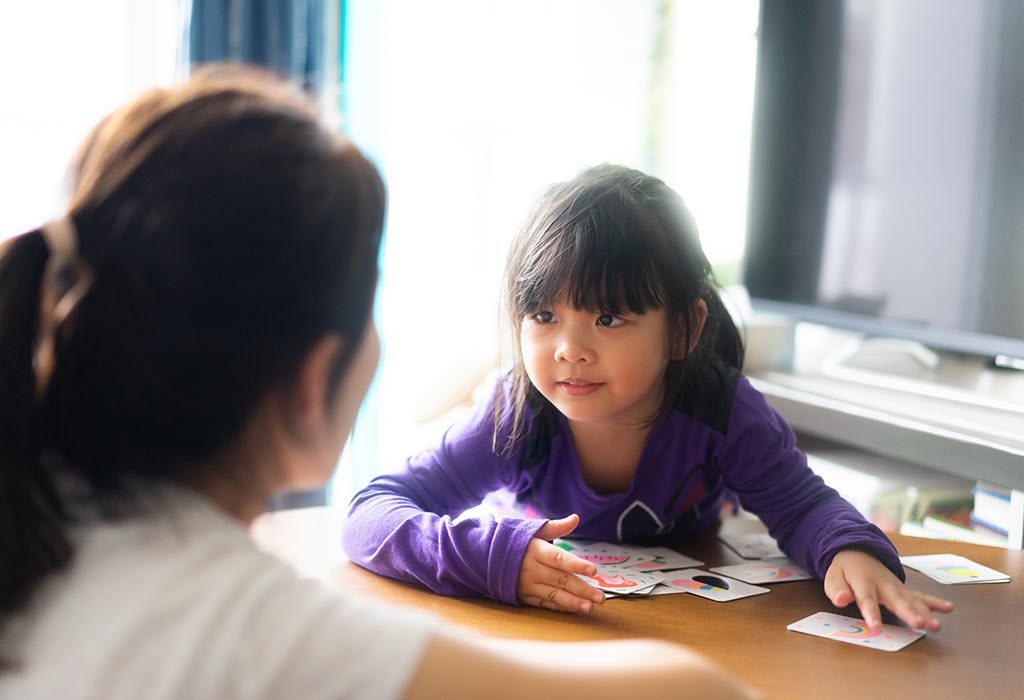
4. Young Scrabble
As a parent, you would have some wonderful memories of playing Scrabble with your family and friends. Use the core concept of the game to come up with a variation for your little one.
What You Need
- Letters from the scrabble set
- A pen and paper
How To Play
Instead of the usual seven letters, give your child a wider variety of letters to use. Make sure vowels are provided aplenty. Ask your child to come up with as many words as he can using those letters. You can provide a guiding list of sorts, by starting him off with three letter words, and then ramp it up to words with more letters. Let him write down each word that he makes on the piece of paper.
5. Connecting Letters And Sounds
The core formation of speech revolves around the connection of letters with typical sounds of speech. Use this game to match the right ones together.
What You Need
- A large whiteboard
- Markers of various colours
How To Play
Start by dividing the board into two columns. On one side, write a bunch of rimes, which would generally be the letters such as b, h, m, y, l, k and so on. In the other column, write as many onsets as you can. These could be anything from an, on, at, or, and many others. Ask your child to assign one coloured marker for each rime and connect them to as many onsets as possible to form legible words. Let him say the words aloud once he connects them.
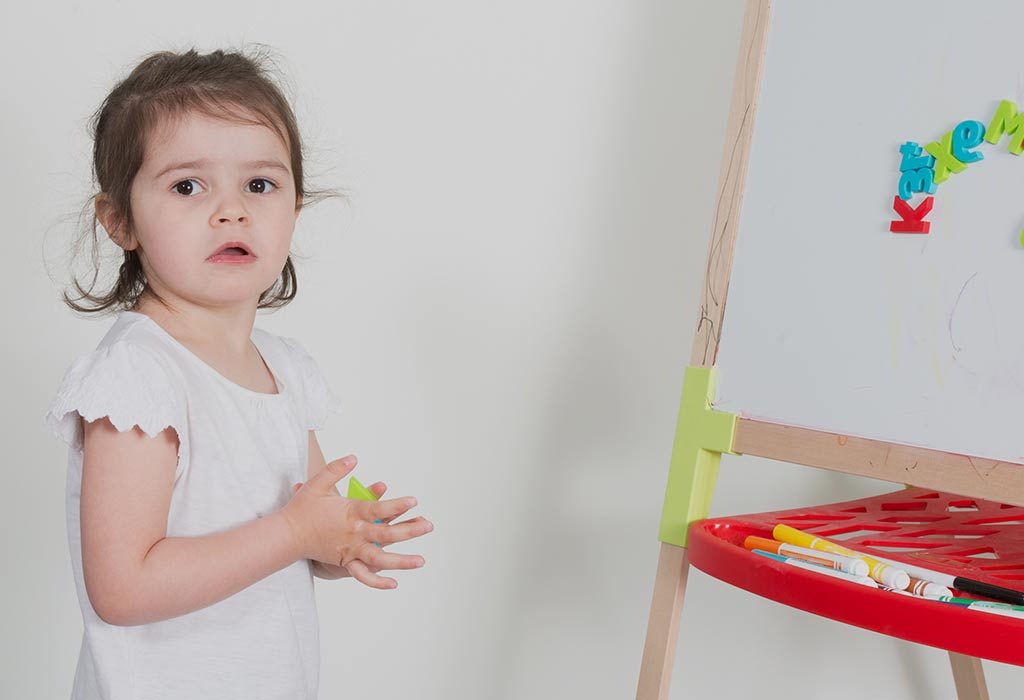
6. A Word Flip Book
Experimentation is a great way for kids to discover and learn new things. The same can be achieved with a flip book game for reading words.
What You Need
- Tiny flipbook diaries
- A Pen
How To Play
Prep the diaries by writing the alphabet on each page of it. Let your child do this as a warming up of sorts. Once all the diaries have a letter on each page, tell a word to your child and let him figure out how many letters there are in it. Based on it, he needs to use those diaries as flip books, arrange them linearly, and flip each one of them to the letter that can spell the word when reading together. You can start off gradually with simpler words and then ramp up to complex ones that can get him racking his brains.
7. Hopscotch Spelling Bee
This game is best enjoyed in a group of children where everybody can work together to achieve a singular objective.
What You Need
- An open area
- A piece of chalk
How To Play
Make around four hopscotch maps in an open area, with each of them having seven letters in them. Each kid is responsible for the letters in his hopscotch map. Now, when you pick a word, the kids have to work together in hopping to the letters in the word in sequential order. For example, if the word is “apple”, the kid with “a” on his map needs to hop there first, followed by the kid with “p” who needs to hop twice, and so on. This can get quite exciting, and you can set a time limit as well to ramp up the drama.
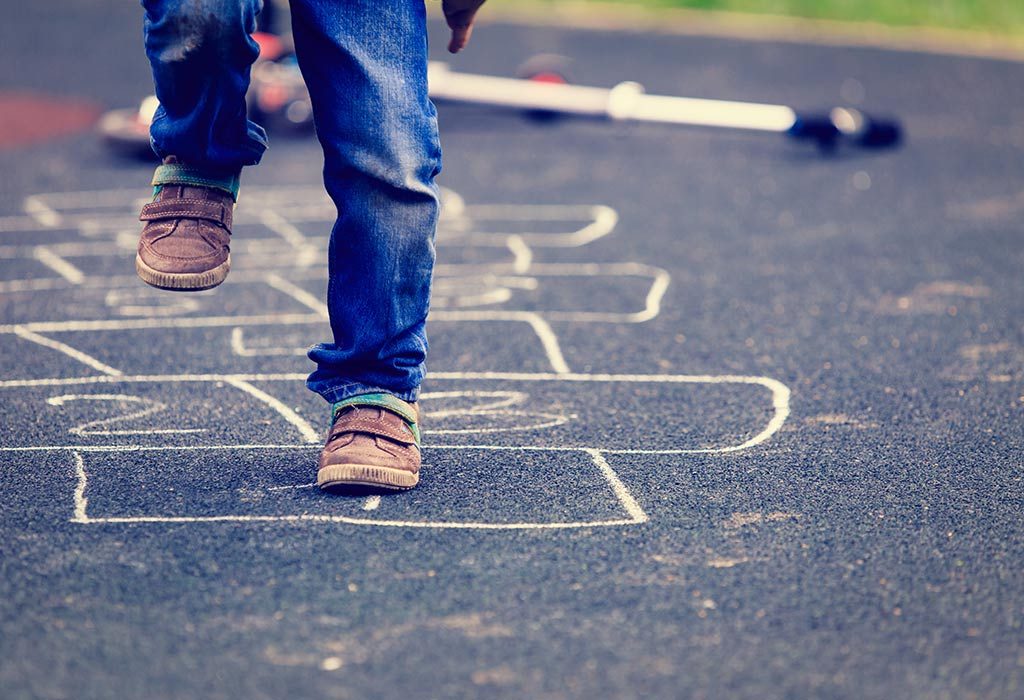
8. Bringing Stories To Life
The benefit of reading can be achieved only when it is read out or experienced again. Let your child do the same by being a storyteller himself.
What You Need
- Simple storybooks
- Some props or interesting clothes
How To Play
Pick out a story that your kid usually loves or has read multiple times. This could be either from a storybook or in any subject of their curriculum as well. Let him make some props that might be required in the story or wear the clothes of a character. Set the mood, prop yourself up on a sofa, and ask your kid to enact the story for you. Ask him to combine storytelling with any actions described in the story itself.
9. Playing I Spy With Words
Haven’t we all enjoyed playing I spy when we go on long drives or picnics? You can do the same with your kids at home using simple words, too.
What You Need
- A good vocabulary
- Interesting objects
How To Play
Put together various objects that might be available at home. Or even take your kid out for a walk in the park or supermarket. Play I spy by saying “I spy something we can drink which begins with m” and let your child decode it and get a can of milk for you. Numerous variation of the game can be achieved. As he grows up, you can replace the simplicity with the concept of rhyme saying “I spy something that rhymes with a mouse”, and your kid can point at a house in the neighbourhood.

10. Taboo Voices
If simple reading is what your child finds extremely boring, spice it up by making it into a game and blending them with some strange voices.
What You Need
- Two copies of the same book
How To Play
Sit with your child and start reading the story. Choose a word that frequently occurs in the book, such as a character name or a place, and assign a specific voice to the word. Now, as you read the story, whenever that word occurs, it should be read in the voice you’ve assigned to it. This can work beautifully for character-driven stories, but you can do the same with random words as well, and make squeaky voices for them as your child laughs in delight.
5 Reading Activities For Kids
Turning the act of reading into a game can be quite fun for you. But for other times, we have come up with some interesting reading activities for kindergarten kids that can keep your child engaged.
1. Reading Photographs
Simply reading words is not enough. Comprehending their meaning and expressing what isn’t written goes a long way in language development of a child, too.
What You Need
- A book of pictures
- A family album
How To Play
Open any page of the book or a nice photo from the family album that is quite descriptive. Ask your child what he thinks is going on in the picture and let him describe it to you. Nudge him to form complete sentences when he explains what he sees.
2. Personal Diary
You might think that kindergarten is too young for a child to have a diary. But this is a perfect age for him to start reading his activities.
What You Need
- A decorated diary and a pen
How To Play
Depending on how old your child is, either you can ask him to write down in the diary at specific intervals, or you can write what your child did in a day as well. Then, on the following day, ask your child to read the entries of the previous day.
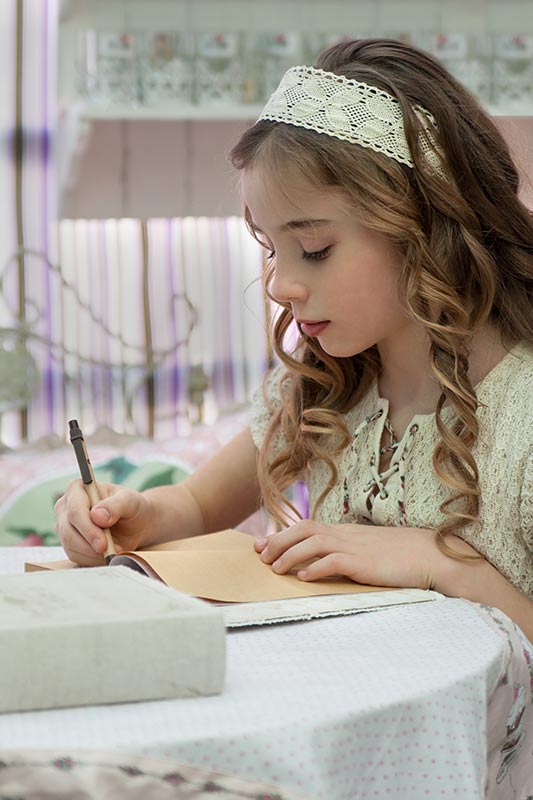
3. Put The Story Together
Along with reading, children also need to be introduced to the concept of causality and the sense of a story. This activity can help them with it.
What You Need
- Multiple flashcards
- A Pen
How To Play
Pick a simple story that your child has read and split into different sections by writing them down on various flash cards. Shuffle them and hand them to your child. Let him arrange the cards in a manner that it reads like a proper story.
4. Picture And Word Association
For the ones that are just beginning out, this simple activity can help assign meaning to words.
What You Need
- A collection of pictures
- Flash cards and a pen
How To Play
Arrange all the pictures around your child and write their names on the flashcards. Ask your child to place the correct flash card on the matching picture by reading it aloud.

5. Word Search
As children grow up, they can involve themselves in activities to find recognisable words from a jumble of gibberish.
What You Need
- An activity book
How To Play
Start by either using solved crosswords or existing word search puzzles to give to your child. Ask him to find specific words in the jumble and circle them with a pencil.
Did you know that all chidren have eight smarts, one of which is Word Smart, which focuses on vocabulary building. Based on Dr. Howard Gardner’s Multiple Intelligence theory, each child has dominant smarts. However, it is possible to hone them all. The Intellikit (also based on the Multiple Intelligence theory) is a one-of-its-kind activity subscription box for kids, that promotes learning through fun activities. Based on a unique theme each month, each box comes packed with worksheets, calendars, cards, and, storybooks that promote development of all 8 smarts in your child. Simply pick your subscription duration or opt for a trial box to get started.
Putting together some interesting reading activities for preschoolers doesn’t seem like a tough job once you know the basics your child needs to adhere to. By utilising these activities, your kid can be well-prepared to handle the demands of the school curriculum with ease.









